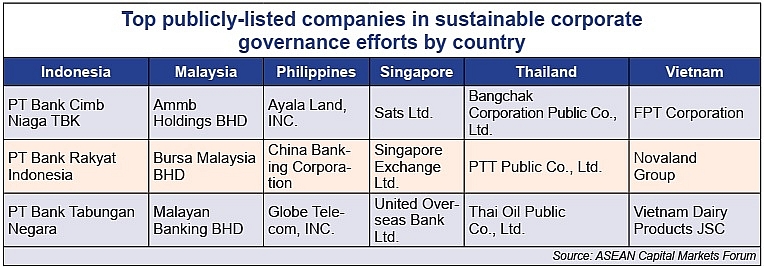Embracing sustainable finance efforts
 |
| Embracing sustainable finance efforts - illustration photo |
Vietnam is implementing a National Strategy for Green Growth and a National Green Growth Action Plan; with both initiatives backed by the financial sector’s action plan to implement the national strategy for green growth.
In Singapore, the Monetary Authority of Singapore announced a Green Finance Action Plan in November 2019 to make green finance a defining feature of the financial sector.
In Brunei, the government issued its Blueprint 2016-2025, with the goal of developing Islamic fund management credentials and promoting investment along the sustainable, responsible, and impact criteria.
The Securities and Exchange Commission in Thailand established a committee and a working group relating to sustainable finance in 2019 to engage representatives from various stakeholders, including the Stock Exchange of Thailand, government agencies, and industry associations.
 |
Green finance, which refers to funds specialising in sustainable development projects such as renewable energy, are envisaged to witness more substantial growth momentum as governments across the globe are laying their focus on cutting pollution and greenhouse gas reduction.
Efforts to promote sustainable finance within the capital markets have so far been focused on introducing sustainable standards for products, disclosure templates for listed companies, and incentives to encourage the industry to adopt sustainable standards.
In the area of disclosures, stock exchanges in six member nations (Indonesia, Malaysia, Philippines, Singapore, Thailand, and Vietnam) have introduced sustainability reporting and issued guidelines for their listed companies. While still at a nascent stage, sustainability reporting is expected to continue to gain momentum in light of the growing demand for increased levels of transparency and accountability.
Last week, the 33rd ASEAN Capital Markets Forum Chairs’ (ACMF) Meeting virtually hosted from Hanoi has shed light on the key priorities for its Action Plan 2021-2025 to realise an inter-connected, inclusive, and resilient ASEAN capital market.
The key priorities are driving higher levels of transparency and disclosure; continuing with regulatory harmonisation; intensifying capacity building; amplifying communication and awareness; and strengthening cooperation and coordination.
The meeting also acknowledged the progress of the forum’s working groups in implementing the six short-to-medium goals identified in the Roadmap for ASEAN Sustainable Capital Markets.
Under the theme of sustainable finance, the ACMF will explore ASEAN-wide bond standards to facilitate issuance for sustainability-related goals. Mitigating climate change and sustainability are an imperative, and financing via the financial markets, including the capital markets, is a fundamental aspect to facilitating and promoting sustainable development.
Tran Van Dung, chairman of the State Securities Commission of Vietnam – who is also the chair of the ACMF 2020 – said, “Vietnam is taking collective approaches to attract more high-quality foreign funds towards fulfilling its sustainability agenda. Besides sustainable finances, efforts to promote the country towards becoming an emerging market is another goal.”
Furthermore, the top 20 ASEAN publicly-listed companies, honoured with an ASEAN Asset Class Award at the meeting included multinational corporations operating in Vietnam such as CIMB, Maybank, UOB, CapitaLand, Fraser, OCBC Bank, and Public Bank.
High-profile international investors are shifting their attention towards environmental, social, and governance criteria by implementing these requirements into their investment processes. Regulators also require more companies to disclose climate-related risks.
What the stars mean:
★ Poor ★ ★ Promising ★★★ Good ★★★★ Very good ★★★★★ Exceptional
Themes: Towards Sustainability
- $100 million initiative launched to protect forests and boost rural incomes
- Decree opens incentives for green urban development
- European expertise to boost Vietnam’s sustainable logistics push
- Living with water: from policy to practice of the 'sponge cities' concept
- From climate pressure to new urban mindsets
Related Contents
Latest News
More News
- Cashless payments hit 28 times GDP in 2025 (February 04, 2026 | 18:09)
- SSIAM and DBJ launch Japan Vietnam Capital Fund (February 04, 2026 | 15:57)
- Banks target stronger profits, credit growth in 2026 (February 04, 2026 | 15:43)
- Vietnam on path to investment-grade rating (February 03, 2026 | 13:07)
- Consumer finance sector posts sharp profit growth (February 03, 2026 | 13:05)
- Insurance market building the next chapter of protection (February 02, 2026 | 11:16)
- NAB Innovation Centre underscores Vietnam’s appeal for tech investment (January 30, 2026 | 11:16)
- Vietnam strengthens public debt management with World Bank and IMF (January 30, 2026 | 11:00)
- Corporate bond market poised for stronger growth cycle (January 28, 2026 | 17:13)
- Vietnam's IPO market on recovery trajectory (January 28, 2026 | 17:04)

 Tag:
Tag:




















 Mobile Version
Mobile Version